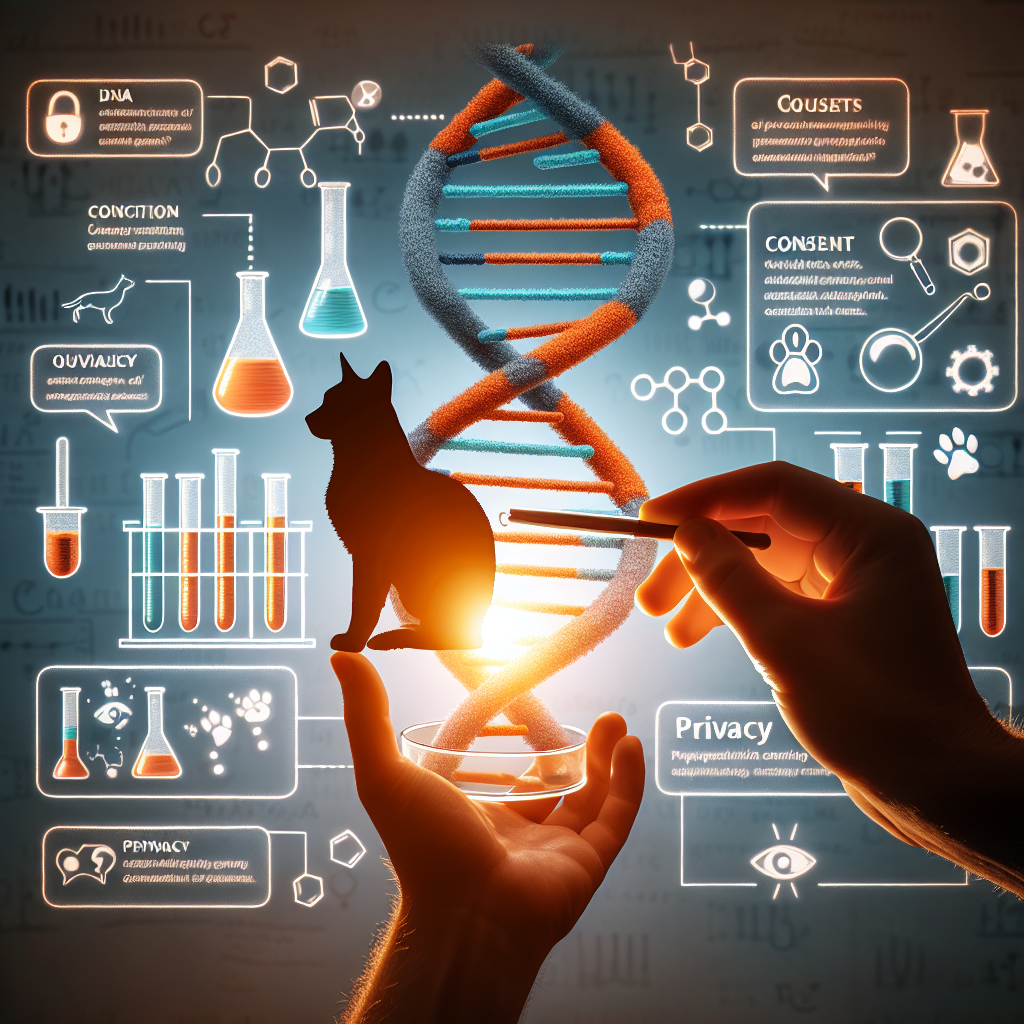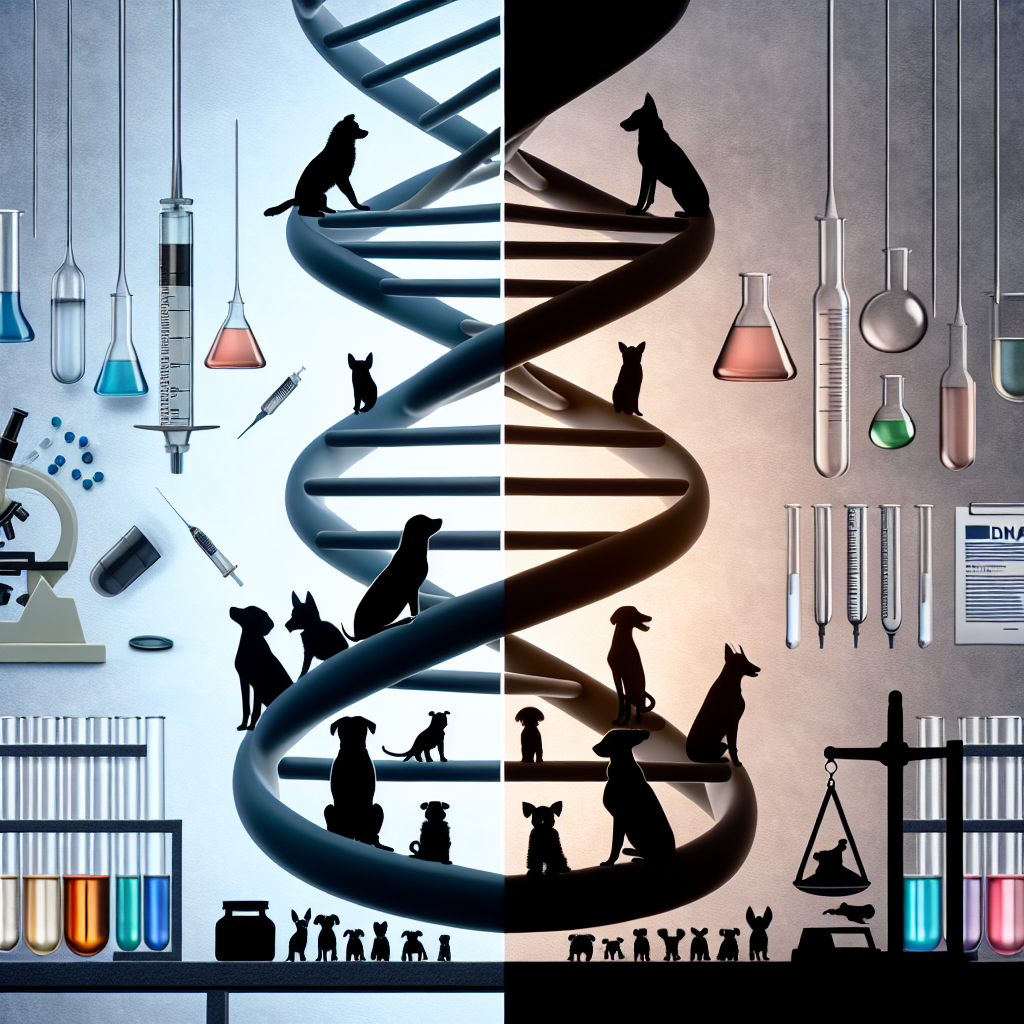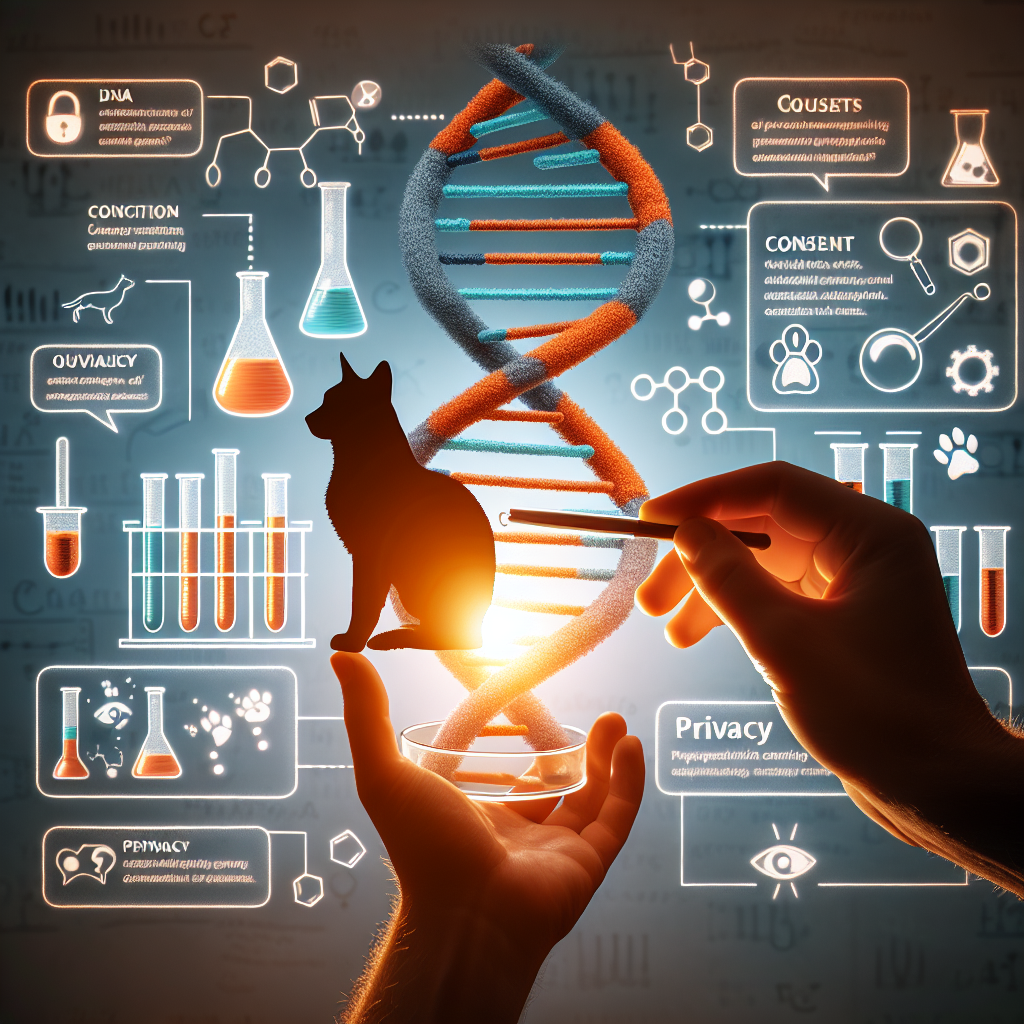Imagine being able to uncover the secrets hidden within your furry friend’s DNA with just a simple test. Pet genetic testing has emerged as a fascinating and rapidly advancing field, allowing us to gain insights into our pets’ ancestry, health risks, and even behavioral traits. However, this breakthrough comes with a host of ethical considerations that need to be carefully pondered upon. As we embark on a journey to unravel the mysteries of our pets’ genes, it is essential to explore the potential ethical dilemmas that arise from this science, ensuring that our pursuit of knowledge aligns with our values of compassion and responsibility towards our beloved companions.
1. Potential Misuse of Genetic Information
1.1 Discrimination Based on Genetic Results
One of the potential ethical concerns surrounding pet genetic testing is the possibility of discrimination based on the results. While genetic testing can provide valuable information about an animal’s health and breed composition, it should not be used as a basis for discrimination or prejudice. Pet owners should not face discrimination from landlords, insurance companies, or other parties solely based on the genetic information of their pets. Discrimination based on genetic results can lead to unfair treatment, exclusion, and limitations on pet owners and their beloved furry companions.
1.2 Breeding and Selection Based on Genetic Traits
Pet genetic testing also raises concerns about breeding and selection based on genetic traits. While responsible breeding is aimed at improving the health and well-being of animals, the potential misuse of genetic information may lead to unethical practices. Breeders should be mindful of not only selecting for desirable traits but also considering the overall health and genetic diversity of the breed. Overemphasis on certain traits can result in the perpetuation of genetic disorders and the potential harm to future generations of animals.
1.3 Confidentiality and Privacy Concerns
Confidentiality and privacy concerns are significant ethical considerations in the field of pet genetic testing. Pet owners must have confidence that their pets’ genetic information is handled with utmost privacy and confidentiality. They should have control over who has access to this data and how it may be used. Pet genetic testing companies and veterinarians must prioritize the protection of this sensitive information and implement robust protocols to ensure its privacy and security.
2. Informed Consent and Ownership of Genetic Data
2.1 Ownership of Genetic Information
The question of ownership of genetic information is an ethical dilemma in the context of pet genetic testing. Pet owners should have ownership rights over their pets’ genetic data, as it reflects their personal property. However, it is essential to recognize that genetic information also has value beyond individual ownership. Researchers, veterinarians, and pet genetic testing companies may find value in analyzing and utilizing this data to enhance animal health and well-being. Striking a balance between individual property rights and the broader benefits that can arise from sharing genetic data is crucial.
2.2 Informed Consent for Testing
Obtaining informed consent from pet owners before conducting genetic testing is an ethical necessity. Pet owners should be fully informed about the purpose, risks, and potential benefits of genetic testing before making a decision. Informed consent empowers pet owners to make educated choices regarding their pets’ genetic testing and fosters a trusting relationship between owners and professionals involved in the process. Ensuring that informed consent is obtained in a clear, transparent, and understandable manner is essential for upholding ethical standards.
2.3 Implications for Breeders and Pet Owners
Genetic testing can have various implications for both breeders and pet owners. For breeders, genetic testing provides valuable information to make informed breeding decisions, promote healthier breeds, and reduce the incidence of genetic disorders. However, it is crucial for breeders to use this information responsibly and prioritize the overall health and welfare of the animals. Pet owners can benefit from genetic testing to assess their pets’ health risks and take preventive measures. It can help them make informed decisions about their pets’ care, and potentially improve their pets’ quality of life.

3. Health and Well-being of Pets
3.1 Psychological Impact on Pet Owners
Pet genetic testing can have a significant psychological impact on pet owners. The discovery of potential genetic risks or predispositions in their pets can cause anxiety, stress, and emotional turmoil. Pet owners may feel overwhelmed and burdened with the responsibility of managing or preventing these conditions. It is crucial for veterinary professionals to provide appropriate support, guidance, and counseling services to pet owners throughout the genetic testing process. Ensuring that pet owners receive accurate information, emotional support, and access to additional resources can help alleviate the psychological impact of genetic testing.
3.2 Emotional and Financial Burden of Genetic Testing
The emotional and financial burden associated with genetic testing is another ethical consideration. Genetic testing can be expensive, and not all pet owners may have the means to access these services. The emotional toll of learning about potential health risks or conditions in their pets can also be significant. It is important for veterinary professionals, pet genetic testing companies, and other stakeholders to consider affordability and accessibility when providing genetic testing services. Efforts should be made to ensure that genetic testing is accessible to a diverse range of pet owners and that appropriate support is available for those facing emotional and financial challenges.
3.3 Ethical Considerations in Treating Genetic Conditions
Treating genetic conditions in pets raises ethical considerations. While genetic testing can identify potential health risks, it does not necessarily guarantee successful treatment options or outcomes. Veterinarians must balance the ethical obligation to provide appropriate care for genetic conditions with the pet’s overall quality of life. Treatment decisions should consider the potential benefits, risks, and burdens associated with interventions. The welfare of the individual pet and the broader implications for the breed or species should also be taken into account. Open and honest communication between pet owners and veterinarians is crucial to ensure ethical decision-making and the well-being of the pet.
4. Responsible Marketing and Consumer Awareness
4.1 Accuracy and Reliability of Test Results
Ensuring the accuracy and reliability of test results is of utmost importance in the ethical provision of pet genetic testing services. Pet genetic testing companies should invest in research, quality control measures, and validation studies to ensure the accuracy and reliability of their tests. Transparency regarding the limitations of the tests, including the extent of breed identification or health risk prediction, is crucial for setting appropriate expectations for pet owners. Test results should be communicated accurately, clearly, and responsibly to avoid misleading or false claims.
4.2 Misleading or Inappropriate Advertising
Ethical concerns arise when pet genetic testing companies engage in misleading or inappropriate advertising practices. Advertising claims should be accurate, supported by scientific evidence, and avoid making unrealistic promises about the outcomes of genetic testing. Responsible marketing practices involve providing pet owners with comprehensive and unbiased information about the benefits, limitations, and potential risks of genetic testing. Misleading or exaggerated advertising may lead to false expectations, misguided decisions, and potential harm to pets and their owners.
4.3 Impact of Demand on Animal Welfare
The demand for pet genetic testing can have unintended consequences on animal welfare. If the demand for specific breeds or genetic traits increases based on test results, it may fuel unethical breeding practices. Unscrupulous breeders may exploit the market by producing animals solely for profit, disregarding the potential health risks and welfare concerns associated with these practices. Responsible marketing of genetic testing should emphasize the importance of considering overall health and welfare in breeding decisions, discouraging unethical practices that prioritize profit over the well-being of animals.

5. Veterinary Medicine and Ethical Guidelines
5.1 Professional Duty and Client Expectations
Veterinarians have a professional duty to uphold ethical guidelines and prioritize the well-being of their animal patients. In the context of pet genetic testing, veterinarians must navigate the potential challenges that arise from client expectations. Pet owners may have high expectations of genetic testing outcomes or seek specific treatments or interventions based on test results. Veterinarians must balance client expectations with the best interests of the animal and ensure that their recommendations are based on sound scientific evidence, ethical considerations, and the pet’s individual circumstances.
5.2 Ethical Challenges in Interpreting Test Results
Interpreting test results can present ethical challenges for veterinary professionals. Genetic testing may identify potential health risks or conditions that have no guaranteed treatment or intervention options. Veterinarians must communicate these results accurately, provide appropriate counseling and support, and help pet owners navigate the decision-making process. Ethical considerations include balancing the potential burdens associated with treatment against the pet’s overall quality of life, considering the availability of resources, and ensuring informed consent before proceeding with any interventions.
5.3 Balancing Commercial Interests with Animal Welfare
Veterinary professionals must navigate the balance between commercial interests and animal welfare when it comes to pet genetic testing. Collaborations with pet genetic testing companies should prioritize the well-being and best interests of the animal. Transparency regarding potential conflicts of interest and financial arrangements should be maintained to ensure ethical practices. Veterinarians must advocate for the welfare and health of the pets, even if it means challenging commercial interests or suggesting alternative approaches to genetic testing when necessary.
6. Breed-Specific Testing and Stigmatization
6.1 Implications for Breeds Prone to Genetic Disorders
Genetic testing has particular implications for breeds prone to genetic disorders. Identifying genetic risks in these breeds can provide valuable information for breeders and pet owners to make informed decisions about breeding programs and individual pets. However, there is a risk of stigmatization associated with breeds that are genetically predisposed to certain conditions. It is essential to approach breed-specific testing in a responsible and compassionate manner, focusing on improving breed health without perpetuating negative stereotypes or discrimination against these breeds.
6.2 Potential for Stigmatization and Discrimination
Breed-specific testing can inadvertently contribute to stigmatization and discrimination. If certain breeds are consistently associated with specific genetic risks, individuals of those breeds may face discrimination, prejudice, or limitations in various contexts. It is crucial to educate the public about the complexities of breed-specific testing, emphasizing that genetic predispositions do not define the individual or predict their behavior or overall health. Responsible use of breed-specific testing should aim to improve breed health without perpetuating stereotypes or discrimination against particular breeds.
6.3 Responsible Use of Breed-Specific Testing
Responsible use of breed-specific testing involves considering the overall welfare and health of the breed, promoting genetic diversity, and avoiding harmful breeding practices. Breeders and pet owners should prioritize responsible breeding practices that consider the wider breed population, potential health risks, and genetic diversity. Collaboration between breeders, veterinary professionals, and genetic researchers can help establish guidelines and best practices for the responsible use of breed-specific testing. Encouraging open dialogue, education, and transparency is crucial to ensuring the ethical use of genetic testing in breeds.
7. Regulation and Oversight of Pet Genetic Testing
7.1 Lack of Regulation and Quality Control
Currently, there is a lack of robust regulation and quality control in the field of pet genetic testing. This absence of oversight raises concerns about the accuracy, reliability, and ethical standards of testing services. The development and implementation of clear regulations and quality control measures are necessary to ensure the ethical and responsible provision of pet genetic testing. Regulatory bodies should establish guidelines, set minimum standards, and enforce compliance to protect the interests of pet owners and the welfare of animals.
7.2 Need for Transparent Standards and Guidelines
To address the ethical implications of pet genetic testing, transparent standards and guidelines are essential. Transparency regarding testing protocols, data analysis methods, limitations, and potential sources of error is crucial for informed decision-making by pet owners and veterinarians. Clear guidelines should be established for laboratories, testing companies, and veterinary professionals, outlining responsible practices, quality control measures, and adherence to ethical standards. Transparency and standardized practices will build trust between pet owners, professionals, and the testing industry.
7.3 Role of Veterinary Associations and Animal Welfare Organizations
Veterinary associations and animal welfare organizations play a vital role in addressing the ethical implications of pet genetic testing. These organizations can advocate for the protection of animal welfare, promote responsible practices, and facilitate collaborative efforts between stakeholders. By establishing ethical guidelines, providing education and training opportunities, and advocating for regulatory measures, veterinary associations and animal welfare organizations can help ensure the welfare of pets and responsible use of genetic testing.
8. Ethical Considerations in Research and Development
8.1 Animal Testing and Ethical Approval
Research and development in the field of pet genetic testing should adhere to ethical considerations, particularly concerning animal testing. It is essential to uphold stringent guidelines for the humane treatment of animals involved in genetic research. Research protocols should undergo thorough ethical approval processes to assess the potential harm, species-specific concerns, and the scientific merit and necessity of the research. Transparency and accountability are crucial when conducting research involving animals to ensure ethical standards are upheld.
8.2 Genetic Research for Profit vs. Public Benefit
Ethical challenges arise when genetic research is motivated primarily by profit rather than the public benefit. While genetic research can lead to the development of new diagnostic tests and treatment options, the pursuit of profit may prioritize commercial interests over animal welfare. Researchers and funding organizations should consider the broader public interest, welfare implications, and potential outcomes of their work. Implementing mechanisms to ensure transparency, accountability, and independent review of research ethics can help mitigate potential conflicts between profit and public benefit.
8.3 Responsible Development of New Genetic Tests
The responsible development of new genetic tests involves careful consideration of their potential applications, limitations, and ethical implications. Researchers, developers, and industry stakeholders should prioritize scientific rigor, accuracy, and transparency in the development and validation of new genetic tests. Well-designed studies and independent evaluations should be conducted to establish the performance and reliability of these tests. Ethical considerations in the development process include potential risks, privacy concerns, and the impact on animal welfare. Responsible development ensures that genetic tests are held to high ethical standards and provide reliable and useful information for pet owners and veterinarians.
9. Education and Awareness for Pet Owners
9.1 Understanding the Limitations of Genetic Testing
Education and awareness are essential for pet owners to understand the limitations of genetic testing. Pet genetic testing cannot provide a complete picture of an animal’s health or behavior, as many factors influence their well-being. Educating pet owners about the specific limitations of genetic testing, including false negatives and false positives, helps manage their expectations and encourages responsible decision-making. Raising awareness about the complexity of genetic testing empowers pet owners to make informed choices and encourages a holistic approach to pet health and care.
9.2 Promoting Responsible Pet Ownership
Pet genetic testing can be an opportunity to promote responsible pet ownership. Educating pet owners about the benefits of genetic testing for overall health and well-being helps them make proactive decisions in caring for their pets. Responsible pet ownership includes routine veterinary care, preventive measures, and a commitment to the welfare of the animal. Genetic testing can be integrated into a broader context of responsible pet ownership, emphasizing the importance of a comprehensive approach to pet health and well-being.
9.3 Enhancing Public Awareness of Ethical Issues
Enhancing public awareness of ethical issues surrounding pet genetic testing is crucial. Educating the public about the potential misuse of genetic information, discrimination, stigmatization, and other ethical concerns helps foster a responsible and informed community of pet owners. Public awareness campaigns, educational resources, and collaborations between veterinary professionals, genetic testing companies, and animal welfare organizations can facilitate a broader understanding of the ethical implications of pet genetic testing. Empowering the public with knowledge and ethical considerations promotes responsible decision-making and enhances the welfare of animals.
10. Future Directions and Ethical Challenges
10.1 Emerging Technologies and Novel Applications
The future of pet genetic testing holds exciting possibilities with emerging technologies and novel applications. However, ethical challenges persist with the advancement of these technologies. As new tests and applications are developed, it is essential to prioritize ethical considerations, scientific rigor, and transparency. Anticipating the potential unintended consequences and ethical questions associated with emerging technologies ensures that ethical standards are maintained as the field evolves.
10.2 Impact of Genetic Testing on Pet Populations
Understanding the impact of genetic testing on pet populations is an important ethical consideration. Genetic testing can influence both breeding practices and the composition of pet populations. It is crucial to assess the potential consequences of genetic testing, such as the risk of reducing genetic diversity or exacerbating breed-specific health risks. Monitoring the impact of genetic testing on pet populations allows for proactive measures to maintain genetic diversity, promote responsible breeding, and address potential welfare concerns.
10.3 Continuous Evaluation and Adaptation of Ethical Guidelines
Ethical guidelines in the field of pet genetic testing should be continuously evaluated and adapted to address emerging ethical challenges. As the field evolves and new technologies emerge, it is essential to revise guidelines to ensure they remain relevant and effective. A collaborative approach involving scientific experts, veterinary professionals, ethicists, and animal welfare organizations can facilitate the continuous evaluation and adaptation of ethical guidelines. This iterative process promotes responsible practices and addresses ethical concerns in pet genetic testing.
In conclusion, pet genetic testing raises a myriad of ethical implications that must be carefully considered. The potential misuse of genetic information, the need for informed consent and ownership of genetic data, the impact on the health and well-being of pets, responsible marketing and consumer awareness, veterinary medicine and ethical guidelines, breed-specific testing and stigmatization, regulation and oversight, ethical considerations in research and development, education and awareness for pet owners, and future directions and ethical challenges all contribute to the complex ethical landscape of pet genetic testing. By acknowledging and addressing these ethical concerns, stakeholders in the field can ensure the responsible and ethical provision of pet genetic testing services that prioritize the well-being of animals and the interests of pet owners.

